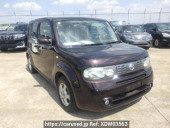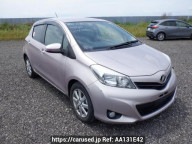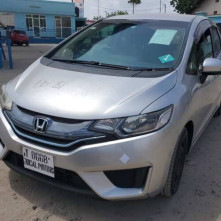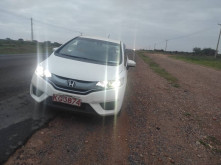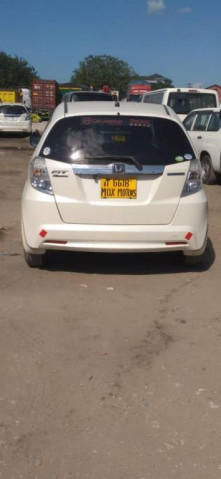Honda Fit Overview
The Honda Fit, also known as the Honda Jazz in some markets, is a subcompact hatchback produced by Honda Motor Co., Ltd. It was first launched in 2001 and quickly gained global popularity for its compact design, excellent fuel economy, and remarkable interior space. Currently, the Honda Fit is in its fourth generation.
The name "Fit" was chosen to reflect the vehicle's adaptability and flexibility, emphasizing how the car can "fit" into various lifestyles, parking spaces, and budgets. The car is particularly beloved in urban areas where space and efficiency are critical.
Popular Specifications for Honda Fit
The Honda Fit is known for its clever design, especially the Magic Seat system, which allows the rear seats to fold in multiple configurations to accommodate cargo of various shapes and sizes. It's a subcompact car with the utility of a small SUV.
Popular Honda Fit Models and Engine Options
Honda Fit GE6 (Second Generation)
- Production: 2007 - 2013
- Engine: 1.3L and 1.5L i-VTEC engines
- Transmission: CVT or 5-speed automatic/manual
- Fuel Economy: Approx. 17 - 20 km/L
- Features: Magic Seat, paddle shifters (in RS variant), enhanced safety features
Honda Fit GP1 Hybrid
- Engine: 1.3L i-VTEC + IMA (Integrated Motor Assist)
- Transmission: CVT
- Fuel Efficiency: 26 - 30 km/L
- Features: Eco assist system, regenerative braking, start-stop engine
Honda Fit GK5 (Third Generation)
- Production: 2013 - 2019
- Engine: 1.3L or 1.5L Earth Dreams i-VTEC
- Transmission: CVT or 6-speed manual
- Features: Enhanced infotainment system, cruise control, Magic Seat, high fuel economy
Honda Fit GR1/GR3 (Fourth Generation)
- Production: 2020 - present
- Engine: 1.3L or e:HEV Hybrid system
- Transmission: CVT or dual-motor hybrid e-CVT
- Features: Honda Sensing, advanced touchscreen interface, digital dashboard
Common Engine: 1.5L i-VTEC (L15A/L15B)
The L15A and L15B engines are reliable 1.5-liter inline-4 engines known for:
- i-VTEC (intelligent Variable Valve Timing & Lift Electronic Control): optimizing performance and fuel efficiency
- Lightweight construction: aluminum block for better heat dissipation and reduced weight
- Low friction technology: for smoother operation and better fuel economy
- Direct Fuel Injection (in L15B): improves power delivery and lowers emissions
- Fuel Efficiency: up to 20 km/L in real-world driving
Common Issues with Used Honda Fit
- CVT Transmission Issues Some older models (especially 2007 - 2012) may show signs of CVT belt wear or delayed engagement. Ensure the CVT fluid is regularly changed.
- Spark Plug Misfire Ignition coil or spark plug issues can lead to misfires, especially if not maintained at regular intervals.
- Suspension Wear Due to urban driving conditions, shocks and bushings may wear prematurely. Look out for clunking sounds or uneven tire wear.
- Hybrid Battery Degradation In the Fit Hybrid (GP1), the IMA battery can degrade over time. A scan tool can confirm the battery health.
- Electrical Glitches Power windows, dashboard lights, or audio system issues can sometimes arise, especially in older models.
Popular Usage
Urban Commuter
Compact size and tight turning radius make the Fit ideal for city driving and tight parking spots.
Shopping and Errands
Thanks to the Magic Seat system, bulky items like bicycles or furniture can fit easily.
Taxi and Car-Hailing Services
Popular in many Asian countries for fuel economy and ease of maintenance.
Small Business Delivery
Cargo space and fuel efficiency make it a great budget delivery vehicle.
Eco-Friendly Driving
Hybrid models are perfect for drivers who want to reduce their carbon footprint without sacrificing versatility.
Rivals of Honda Fit
Toyota Vitz/Yaris
Comparable in size, but Fit often wins in cargo space and rear seat usability.
Mazda Demio (Mazda2)
Sportier drive feel, but Fit offers more interior flexibility.
Mazda Verisa
Taller and boxier than the Fit, the Verisa focuses on cabin comfort and an upscale feel, but it lacks the Fit's renowned cargo versatility and fuel-efficient hybrid options.
Find the Best Used Honda Fit Today!
Looking for a reliable and budget-friendly hatchback? Explore our stock of used Honda Fit models at Carused.jp, your trusted exporter of high-quality Japanese used vehicles.
From daily commuters to hybrid eco-drivers, we have the right Honda Fit for your needs. All vehicles undergo a pre-export inspection and come with verified mileage and full transparency.
FAQ - Honda Fit
- Is the Honda Fit good for long drives?
- Yes. Despite its small size, the Honda Fit is surprisingly comfortable on long drives thanks to its roomy interior, efficient fuel consumption, and supportive seating.
- Which year of Honda Fit is the most reliable?
- The 2013 - 2014 and 2016 - 2018 models are often regarded as the most reliable, with fewer reported transmission or electrical issues.
- What is the fuel consumption of the Honda Fit?
- Depending on the engine and generation, the Honda Fit offers between 17 to 30 km/L, with the Hybrid model achieving the highest figures.
- Does the Honda Fit have enough cargo space?
- Yes. With the Magic Seat feature, the Fit offers up to 1,600 liters of cargo space — one of the largest in the subcompact class.
- Is the Honda Fit a hybrid?
- Some models, like the GP1 and GR3, come with Honda's hybrid systems such as IMA or e:HEV, offering excellent fuel efficiency and eco-friendly driving.
- Is Honda Fit better than Toyota Vitz?
- While both are excellent compact hatchbacks, the Honda Fit typically wins in interior space, versatility, and cargo flexibility thanks to the Magic Seat.


![Used 2012 AT honda fit-hybrid GP1 Image[0]](https://d1og64tg0ubvon.cloudfront.net/refno-cars/2025/0413/4523725/001.jpg?w=600&ts=1744511162)
![Used 2012 AT honda fit-hybrid GP1 Image[1]](https://d1og64tg0ubvon.cloudfront.net/refno-cars/2025/0413/4523725/002.jpg?w=600&ts=1744511162)
![Used 2012 AT honda fit-hybrid GP1 Image[2]](https://d1og64tg0ubvon.cloudfront.net/refno-cars/2025/0413/4523725/003.jpg?w=600&ts=1744511162)
![Used 2012 AT honda fit-hybrid GP1 Image[0]](https://d1og64tg0ubvon.cloudfront.net/refno-cars/2025/0413/4523725/001.jpg?w=95&ts=1744511162)
![Used 2012 AT honda fit-hybrid GP1 Image[1]](https://d1og64tg0ubvon.cloudfront.net/refno-cars/2025/0413/4523725/002.jpg?w=95&ts=1744511162)
![Used 2012 AT honda fit-hybrid GP1 Image[2]](https://d1og64tg0ubvon.cloudfront.net/refno-cars/2025/0413/4523725/003.jpg?w=95&ts=1744511162)

